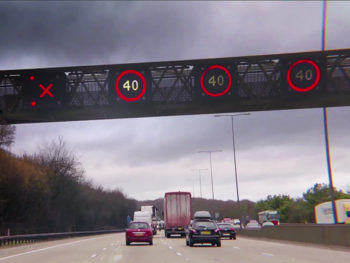Political parties have an opportunity to finally commit to scrapping all ‘smart’ motorways – or potentially face another ‘Post Office-type’ scandal if they do nothing.

The stark warning comes from the AA, which continues to press for change after more than a decade of warning of the dangers of smart motorways.
With the countdown continuing to the general election on 4 July, it is still not clear what stance the political parties will take on smart motorways. Labour had called for an outright ban in 2023 – but has now watered this down, saying it will carry out a “review” of the controversial roads if it wins the general election, according to The Telegraph.
Prime Minister Rishi Sunak announced in April 2023 that new smart motorways would be scrapped. And National Highways’ latest stocktake accepts: “The risk of a collision and the risk of a serious injury or death due to a stopped vehicle collision is lowest on conventional and controlled motorways [which have hard shoulders].’
Abolishing the remaining ‘smart’ motorways is a major plank of the AA’s Motoring Manifesto and is supported by 81% of drivers.
The motoring services organisation has come up with a solution for the existing 193 miles of ‘All Lane Running’ smart motorways and the 63 miles with a ‘Dynamic Hard Shoulder’ – where the hard shoulder is used as a traffic lane when it is busy.
The AA said its solution would prove relatively simple and inexpensive. On the All Lane Running sections, reinstate the hard shoulder with a Red X and new lane markings. This would bring them in line with the Dynamic Hard Shoulder sections.
The objective would be on all these stretches for the hard shoulder to be in place permanently, but the technology – overhead gantries and the use of ‘Red Xs’ – would still give the opportunity to open this lane to traffic in exceptional circumstances.
The safety advantage is that there would be fewer live lane stops, and keeping the emergency areas and overhead technology adds an extra layer of safety.
These stetches would then become controlled motorways. Controlled motorways with hard shoulders and overhead technology are among the safest roads with reduced live lane stops and incidents. Controlled motorways and Dynamic hard shoulder motorways have lower rates for those killed or seriously injured.
While critics argue that one third of capacity could be lost by giving back the hard shoulder, leading to congestion, the AA refutes this. It says smart motorways don’t really alleviate congestion as more than a third of drivers don’t use the inside lane as they are petrified there may be broken-down vehicles ahead. It also says middle lane hoggers reduce capacity.
The AA also points out that any incident on ‘smart’ motorways causes severe congestion by closing lanes, slowing traffic and delaying the emergency services getting through to crashes, which again puts lives at risk.
To help maintain capacity, the reinstatement of hard shoulders should be backed up by major police campaigns targeting offenders and hard-hitting lane discipline information campaigns to get rid of the middle-lane hoggers and free up road space.
Reinstating the hard shoulder also means the emergency services can get to life-threatening incidents more quickly. The first hour after a casualty collision is the ‘golden hour’ when it is essential to get trauma patients to hospital to give them a better chance of living.
Edmund King, AA president, said: “The ‘smart’ motorway experiment has failed.
“Politicians need to stand up and be counted. There is no great love for ‘smart’ motorways and the vast majority want them scrapped.
“Despite all the hundreds of millions of pounds being spent to retrofit and try to justify a flawed concept, now is the time for a radical change. Drivers do not trust ‘smart’ motorways.
“The answer should be reinstating the hard shoulder, and this should be the aim of every political party if politicians really want to promote motoring-friendly policies. It will be safer and much smarter.
“If not, history suggests future governments will have another ‘Post Office-type’ scandal on their hands, as politicians and civil servants knew from the outset that lives would be put at risk by removing the hard shoulder and putting in inadequate emergency areas.”

